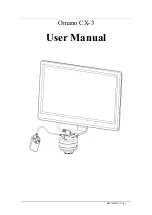
Model 2651A High Power System SourceMeter® Instrument Reference Manual
Section 7: Command reference
2651A-901-01 Rev. A / March 2011
7-3
Syntax rules for instrument commands
Syntax rule
Details
Examples
White space:
Not
required in a
function.
Functions can be sent
with or without white
spaces.
The following functions, which set digital I/O line
3 low, are equivalent:
digio.writebit(3,0)
digio.writebit (3, 0)
Function
parameters:
All
functions are
required to have a
set of parentheses ()
immediately
following the
function.
You can specify the
function parameters by
placing them between
the parentheses. Note
that the parentheses are
required even when
there are no parameters
specified.
The following function specifies all overlapped
commands in the nodes in group G must
complete before commands from other groups
can execute:
waitcomplete(G)
The command below reads the value of the
local time zone (no parameters are needed):
timezone = localnode.gettimezone()
Multiple
parameters:
Must
be separated by
commas (,).
Some commands require
multiple parameters,
which must be separated
by commas (
,
).
This command sets the beeper to emit a
double-beep at 2400 Hz, with a beep sequence
of 0.5 seconds on, 0.25 seconds off, and then
0.5 seconds on:
beeper.beep(0.5, 2400)
delay(0.250)
beeper.beep(0.5, 2400)
Logical instruments
You would normally refer to all instrumentation in one enclosure or node as a single instrument. In the
context of Test Script Processor (TSP
®
) scripting engine and instrument commands, it is useful to
think of each individual subdivision in an enclosure, such as a card slot or the channels, as a
stand-alone instrument. To avoid confusion, all subdivisions of the instrumentation in an enclosure
are referred to as "logical instruments."
Each logical instrument is given a unique identifier in a system. These identifiers are used as part of
all commands that control a given logical instrument. The logical instruments are:
•
beeper
•
gpib
•
bit
•
lan
•
digio
•
status
•
display
•
timer
•
eventlog
•
trigger
•
errorqueue
•
tsplink
•
format
NOTE
Do not create variable names that are the same as names of logical instruments. Doing so will result
in the loss of use of the logical instrument and its associated commands. For example, if you send the
command
digio = 5
, you cannot access the
digio.*
commands until you turn off the power to
the instrument, and then turn it on again.















































